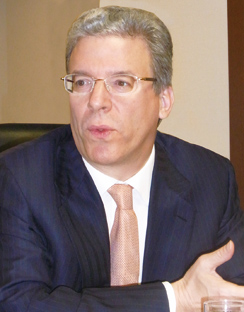
Rio Tinto’s CEO Tom Albanese emphasized aggressive expansion of iron ore and coking coal to serve growing Asian steel industry. He said to Japanese reporters in Tokyo last week the firm will seek opportunity for further cooperation with Japanese companies while the firm already has 16 joint ventures.
Mr. Albanese said the firm already has strong relationship with Japanese steel makers in iron ore and coking coal business and expands the businesses through cooperation with Japanese joint venture partners when Robe River Iron Associates represents important part of iron ore operations in Pilbara, Western Australia. He had constructive discussion with Japanese partners for growth opportunity last week. Mr. Albanese said the firm already decided to add second wharf to Cape Lambert port to expand the Pilbara iron ore shipping capacity by 50 million tonnes to annual 283 million tonnes by 2013. He said with pending additional expansion of Cape Lambert, the Pilbara capacity will reach 333 million tonnes by 2015. He said the firm also studies Mesa A and West Angelas mines for further expansion. He said the firm also expands the Canadian operation and develops Simandou mine in Guinea in next 5 years. He emphasized the aggressive expansion is commitment to world steel industry. He said the firm needs watching steel industry’s situation for further expansion option. Mr. Albanese said the firm cannot expand Queensland hard coking coal and New South Wales semisoft coking coal production fully due to limited availability of Australian public rail and port facility. He said the firm will increase the production to match pending expansion of the public port and rail capacity. He also emphasized the firm develops Mozambique coking coal mine to ship first coal in early 2012 and increase the output in 5-10 years. Mr. Albanese said the firm expects strong constructive relationship with a merger company of Nippon Steel and Sumitomo Metal Industries as the existing relationship each with Nippon Steel and Sumitomo Metals. Mr. Albanese sees iron ore market is weak due to mixture situation of slower Asian demand and higher supply into Asia when Chinese construction market slows under anti inflation policy of Chinese government and iron ore majors keep high level production. However, he expects the situation in seaborne iron ore market is much better than fourth quarter of 2008. He is also confident Rio Tinto can sell the all of the production due to the strong low cost producer position. Mr. Albanese said iron ore pricing is changing and some contract gets shorter period of time. He said Japanese users respect quarterly pricing and Rio Tinto is comfortable for the quarterly price as long as Japanese users keep the position. Mr. Albanese said he admires Japanese steel makers’ ability to adjust themselves to changing situation. He said Japanese should improve the competitiveness through the technology advantage and Rio Tinto will support Japanese steel makers.











